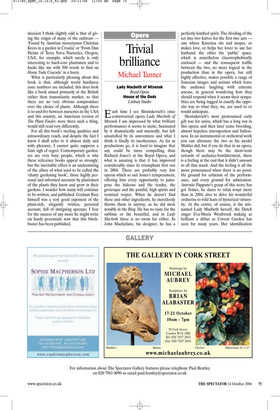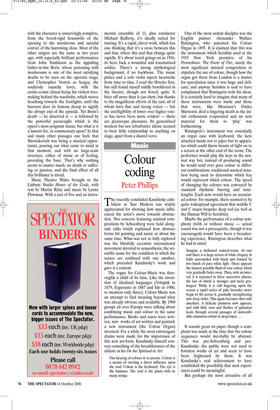Trivial brilliance
Michael Tanner
Lady Macbeth of Mtsensk Royal Opera House of the Gods Linbury Studio
Each time I see Shostakovich’s once controversial opera Lady Macbeth of Mtsensk I am impressed by what brilliant performances it seems to incite, fascinated by it dramatically and musically, but left unsatisfied by its unevenness and what I think is finally its incoherence. As far as productions go, it is hard to imagine that any could be more compelling than Richard Jones’s at the Royal Opera, and what is amazing is that it has improved considerably since its triumphant first run in 2004. There are probably very few operas which so suit Jones’s temperament, offering him every opportunity to juxtapose the hideous and the tender, the grotesque and the painful, high spirits and terminal torpor. When he doesn’t find these and other ingredients, he mercilessly throws them in anyway, as he did most notably in the Ring. He has no taste for the sublime or the beautiful, and in Lady Macbeth there is no room for either. In John Macfarlane, his designer, he has a perfectly kindred spirit. The dividing of the set into two halves for the first two acts one where Katerina sits and mopes, or makes love, or helps her lover to axe her husband; the other the ‘public’ space, which is nonetheless claustrophobically enclosed — and the consequent traffic between the two, no more logical in the production than in the opera, but still highly effective, makes possible a range of Jonesian images and actions which leave the audience laughing with extreme unease, in general wondering how they should respond when it seems their sympathies are being tugged in exactly the opposite way to what they, we, are used to or would anticipate.
Shostakovich’s most pronounced early gift was for satire, which has a long run in this opera; and then later came brooding, almost hopeless introspection and listlessness. In an instrumental or orchestral work you can alternate the two as his model Mahler did; but if you do that in an opera, though there may be the short-term rewards of audience-bewilderment, there is a feeling at the end that it didn’t amount to all that much. And the feeling is all the more pronounced when there is no possible ground for criticism of the performance, and every ground for admiration. Antonio Pappano’s grasp of this score has got firmer, he dares to relax tempi more than in 2004, also to drive his wonderful orchestra to wild feats of hysterical virtuosity. At the centre, of course, is the misnamed Lady Macbeth herself, the Dutch singer Eva-Maria Westbroek making as brilliant a début as Covent Garden has seen for many years. Her identification with the character is unnervingly complete, from the bored-rigid housewife of the opening to the murderous and suicidal convict of the harrowing close. Most of the other singers are the same as two years ago, with especially brilliant performances from John Tomlinson as the appalling father-in-law Boris, whose poisoning with mushrooms is one of the most satisfying deaths to be seen on the operatic stage, and Christopher Ventris as Sergey, the soullessly raunchy lover, with the erotic–comic climax being the violent lovemaking behind the wardrobe, which moves headlong towards the footlights, until the bassoon does its famous droop to signify the abrupt end of the episode. Yet Boris’s death — he deserved it — is followed by the powerful passacaglia which is the opera’s most poignant music; but what is it a lament for, or commentary upon? In that and many other passages one feels that Shostakovich was being a musical opportunist, pouring out what came to mind at that moment, and with no large-scale structure, either of music or of feeling, providing the base. That’s why nothing seems to matter much, no death or suffering or passion, and the final effect of all this brilliance is trivial.
Music Theatre Wales brought to the Linbury Studio House of the Gods, with text by Martin Riley and music by Lynne Plowman. With a cast of five and an instru mental ensemble of 11, plus conductor Michael Rafferty, it’s ideally suited for touring. It’s a rapid, clever work, which has one thinking that it’s a cross between this and that, where this and that change quite rapidly. It’s about weird goings-on in 1916, its hero Jack a wounded and traumatised soldier. There’s a strong mythological background, if no backbone. The music pulses and a solo violin injects heartache from time to time. I read the libretto first, but still found myself mildly bewildered in the theatre, though not bored, quite. It bites off more than it can chew, but thanks to the magnificent efforts of the cast, all of whom have fine and strong voices — but the intelligibility of lower over higher voices has never been more evident — there are picaresque pleasures. Its generalised modern but not rebarbative idiom seemed to bear little relationship to anything on stage, apart from a shared verve.



































































































 Previous page
Previous page